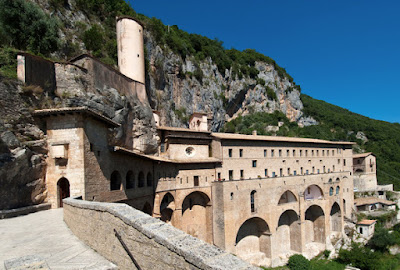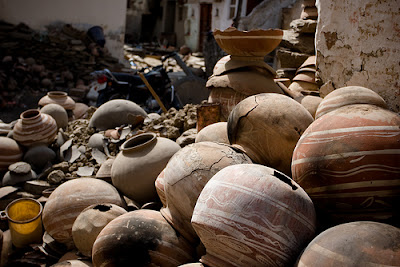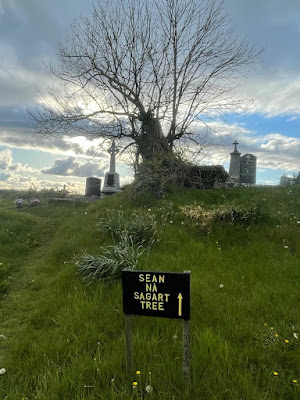There is a man known as Brother Andrew, who died a few years ago, who co-founded the Brothers of Charity along with Mother Teresa. She asked him to help her do this. He was a Jesuit priest. He begins a short book about his visit to their various communities around the world, with an extraordinary line. He says: ‘Few understand the great weakness on which the Missionaries of Charity are built.’ As he goes on, you can see more and more what he is talking about. He himself suffered from some form of addiction and he is quite open about it. This caused him great humiliation. At one stage he was even asked to leave the order, as some of them thought he had a drink problem. A few months later they realised they were quite wrong and asked him to come back. You can see from his writings the extraordinary things that God did through him, through all this weakness.
The Church has always flourished in weakness, in small, disorganised groups who are really open to the movement of the Spirit. The bigger and more powerful we become, the more we rely on ourselves. The Church is full of experts and there is nothing wrong with that. The problem is when we begin to rely too much on our own expertise and not enough on the guidance of God’s Spirit, who so often moves in the most unexpected ways and asks people to do the last thing that most of us would choose.
Today I would like to share with you something more personal than I usually would. I would like to tell you why I became a priest, which is something I get asked all the time.
First of all I believe that God called me to be a priest. There was a real sense of God calling me in this way and it was a persistent call. Although it was something both exciting and wonderful, it was also something scary and painful. I knew it would mean that I would not get married, which is a normal attraction for anyone. But what I always say to people is that the calling to be a priest was stronger than the calling to be married, even though both were there. People often argue against celibacy, but the reasoning behind celibacy is making the sacrifice of married life, to completely dedicate yourself to serving God. It is also a sign of the world to come, since we won’t be married in the world to come and it is a reminder of that. People argue that if there were married priests it would resolve the issue of not enough vocations, but that is not necessarily so either, as the Orthodox Church, which is also Catholic, has married priests and they have the same shortage and problems that we have.
During my teens I drifted away from the practice of my faith for a while, but then through a prayer group, which was started because of the apparitions in Medjugorje, it brought me back to my faith and I began to take it more seriously than before. Then after three years going to this group and growing in my faith, I began to feel this calling again.
The year I entered the seminary was the year when all the scandals began to break in Ireland. It started with the news of my own bishop having had a child years before and it got steadily worse with all the sexual abuse scandals, which were truly horrific. Morale hit rock bottom while I was in the seminary and it made all of us think about why we were there. But God’s call is a mysterious thing and very hard to resist and so I kept going.
After I was ordained the scandals continued and the atmosphere in our society was very difficult to work in as a priest. I know it was the same here in the US. Because of the way the media presented it, drip-feeding story after story to the public, almost every priest was considered a pedophile, which was very difficult, as you can imagine. Why would I want to be part of an organization that tried to cover up such horrific scandals? The reason is simple: I believe.
I believe that Jesus Christ is Lord; that Jesus is the Son of God. I believe that Jesus is present in the Eucharist, not in a symbolic way, but really and truly present. I believe that the bread and wine really and truly become the Body and Blood of Jesus through the hands of a priest in each mass. I can’t imagine a greater privilege than being God’s instrument in this way. I always consider it an honor and a privilege to be allowed to go to the altar and celebrate the mass, even when I’m half asleep on a Monday morning, or when I humanly don’t feel like doing it. Sometimes it scares me when God reminds me that I am a sinner and struggle like everyone else and yet He allows me to do this for his people, because He wants us to be able to receive him in Holy Communion. For all of us that is an incredible gift. I do not understand it, but I believe it.
At times when I feel overwhelmed by my own weaknesses, I think of one of St. Peter’s first encounters with Jesus. Jesus asked him to use his boat as a platform to preach from. When He was finished He said to Peter, ‘Put out into the deep and let down your nets for a catch’ (Luke 5:4). Then there was the miraculous catch of fish. What was Peter’s reaction when he saw the miracle? He said, ‘Leave me Lord for I am a sinful man’ (Luke 5:8). He was afraid because he knew he was in the presence of someone holy, someone extraordinary. But Jesus replied, ‘Do not be afraid.’ And then Jesus called him to follow him. Our sinfulness is not an obstacle for God. God doesn’t need perfect people, just an open heart, because He is the One who does everything. We are just instruments.
I also believe that God speaks to us through the sacred scriptures. God actually speaks to us personally and God has much to say to us. He is constantly guiding us and teaching us. The scriptures were written by human hands, but they were inspired by God and that is why we never replace them with anything else. That is why we continue to read them over and over again and one of the things that I also love to do as a priest is to read the Gospel and try and make sense of them, try and help us to see what God is saying to us.
I also consider being able to hear confession a great privilege. To be God’s instrument to bring his forgiveness and mercy to people is something wondrous. That people will come to me as God’s instrument is both humbling and wonderful to me. You might wonder what could be so special about hearing all the sins that people have committed, but that’s not what I see. What I see is people repenting and wanting to be at rights with God, which is always very inspiring. I have heard confessions in many international places of pilgrimage, listening to people from all over the world and what is consoling is that everyone is struggling with the exact same sins, regardless of culture and background. It helps you to see that this is the human race. We are sick because of sin, and that is why we need the saving work of Jesus to set us free. We all struggle the same way.
As a priest I am called to people when they are sick and dying, right to their bedside, even though I do not know them and they will tell me things that they will not tell anyone else. I am asked to be there when families are going through great joys and sorrows.
Is it difficult? Yes. I have often struggled with it over the last 25 years. Twice I almost left. In fact one time I thought it was all over and I had even told people that I was leaving, not because I wanted to, but because I thought that I couldn’t handle the stress of it anymore; the daily hostility I was experiencing and the sense of isolation I felt in some of the places I was working. Yet each time the Lord called me back and showed me that He would take care of it and He did.
In the second reading today it says:
God chose the foolish of the world to shame the wise,
and God chose the weak of the world to shame the strong,
and God chose the lowly and despised of the world,
those who count for nothing,
to reduce to nothing those who are something,
so that no human being might boast before God.
In a mysterious way God seems to delight in calling and working through the nobodies of this world, so that it is all the more obvious that it is his power at work and this is something He continually shows me. My faith keeps changing and growing and the path is often difficult, but I believe it is the most important path we will ever be asked to follow and so by God’s grace I will continue. I would like to finish with this quotation where St. Paul is talking about his own life.
I believe nothing can happen that will outweigh the supreme advantage of knowing Christ Jesus my Lord. For him I have accepted the loss of everything and I look on everything as so much rubbish if only I can have Christ and be given a place in him. (Philippians 3:7-8)













